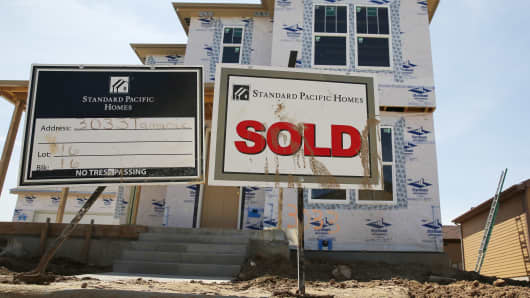Recapping the day's news and newsmakers through the lens of CNBC.
Sales of new homes surge despite rising loan rates
Notes:
Sales of new homes can ripple through the economy, as construction workers, real estate agents, furniture salespeople and others spend their growing wages. So it was good news for all when the Commerce Department reported Wednesday that new-home sales had hit a five-year high. Sales increased 8.3 percent from May to June, to an adjusted annual rate of 497,000 units, beating economists' forecasts of 482,000.
Not only that, but June sales were 38.1 percent above the year ago figure, the largest increase since January 1992. It was the third straight month of gains in new home sales, and helped ease any concerns over a slight dip in existing home sales reported earlier in the week. Some blamed that drop on rising mortgage rates, but that doesn't seem to have frightened buyers of new homes.
The median price of new homes has risen 7.4 percent over the past year.
Data on housing inventories is heartening, too. Supplies of new homes increased 1.3 percent to 161,000, showing that builders are confident enough to ramp up production. Overall, housing supplies remain tight, though. It would take 3.9 months to sell all the houses on the market at June's sales pace. A six-month supply is considered healthy, so it looks like there's plenty of opportunity for would-be sellers to get off the sidelines.
Quotes:
"This is a great number, especially since we have to remember this is really the first number we are seeing which will show the effect of that spike in mortgage rates in June. ... Apparently it was not a problem for the new home buyer."
—CNBC's Diana Olick
"We're in the early stages of a housing recovery. ... This is a three-, four-, maybe even a five-year correction process."
—Richard Smith, CEO of Realogy
Ford beats expectations, shares rise
Notes:
Ford shares rose after the company reported better-than-expected earnings for the second quarter. Even better, the automaker raised its profit and sales forecasts for the year. Excluding one-time items, Ford earned 45 cents a share, smashing analysts forecast of 37 cents.
If you're a Ford shareholder, you can thank Americans for their infatuation with F-150s and other pickups. Pickup sales jumped 22 percent in the first six months. The company also said growing sales in China offset persistent but narrowing losses in Europe.
Demand for pickups is so strong the company said that to minimize downtime it will keep building 2013 models even as it starts making the 2014 versions. The new trucks will use more aluminum, making retooling tricky.
Quote:
"In order to ramp up, you have to retool ... and that means you have to take capacity offline. To do that at a ... time when demand is so strong makes it a bit challenging."
—IHS Automotive analyst Mike Jackson
Will Chinese government ramp up stimulus?
Notes:
As China goes, so goes the rest of the world. Well, that may be overstating it a bit, but many economists and business leaders have been concerned that economic slowdown in China could ripple through the world economy. Apple, for instance, has seen slowing sales in China.
Will the Chinese government, eager to maintain its target 7.5 percent growth rate, take measures to stimulate growth? Some economists, though not all, think so, arguing that the target cannot be met otherwise. Employment levels are critical to Chinese leaders, and a key employment index recently came in at a 52-week low. Fortunately, that has yet to dampen the optimism ofChinese job seekers, but eventually it could, leading to the kind of unrest that terrifies Chinese leaders.
To respond, the government could step up spending in the third quarter, perhaps to support housing, railways or urban infrastructure. Another option would be to let the currency depreciate, or to cut the central bank's reserve requirement ratio.
Quote:
"Combined with the broad-based slowdown in economic activity in June, we expect more announcements from various government bodies in the coming weeks to support growth."
—Barclays economist Jian Chang
Two troubling signs for the world economy
Notes:
If you think the global economy isn't quite what it ought to be, consider these indicators: IPOs and penthouse sales.
Penthouse sales? That's right. A report from the National Association of Realtors says U.S. sales to foreign buyers fell from $82.5 billion in first-quarter 2012 to $68.2 billion in the same period this year. The steepest decline was in high-end sales, such as those to Chinese and Brazilian buyers. The high-end market in Miami is especially dependent on Brazilian buyers.
Concerning those IPOs, the global market, by one man's estimate, is about half what it ought to be. Magnus Bocker, CEO of the Singapore Exchange, says the weak IPO market reflects investor's skittishness over volatile stock prices.
Quotes:
"The overseas wealthy have poured billions of dollars into luxury real estate in the U.S., but that spending may be slowing down. ... This has been the big fear among brokers, that all this buying support from overseas could start to crumble."
—CNBC's Robert Frank
"We should probably be at 2,300 to 2,400 [global IPOs per year] for the next 10 years. So if you take that as a measure and look at it now, we are at a run rate of around 1,000 to 1,200. I would say we are 40 to 50 percent down."
—Singapore Exchange CEO Magnus Bocker
—By Jeff Brown, Special to CNBC.com


